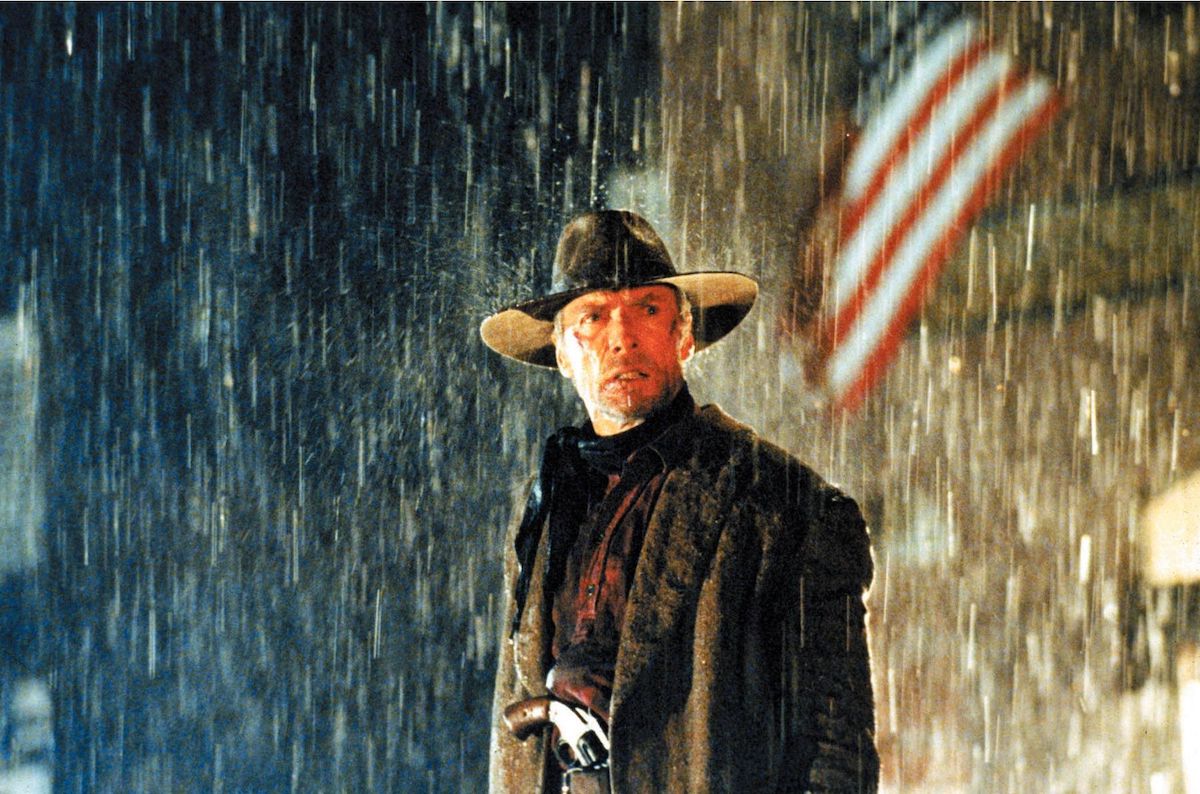Very few people have left a mark on Hollywood like the one from Clint Eastwood. He seamlessly transitioned from television to films and then planted himself in the director’s chair for some of the most beloved and emotional films over the past 40 years. Eastwood already was an icon thanks to his appearances in films like Hang Em High and The Man with No Name trilogy from Sergio Leone but his direction and lead acting performance in 1992’s Unforgiven brought new life to the western genre and showed what depth these stories held.
By the early 1990’s, westerns had been all but played out. Its directors had moved on to other stories and its actors had transitioned to other roles. Thanks to contributions from the likes of the aforementioned Leone, John Wayne and Eastwood himself, westerns were at their peak during the 60’s and early 70’s; they were cheap to produce and could recycle storylines and plot points to make different films. The John Wayne films Rio Lobo and Rio Bravo are essentially the same movie, don’t at me. There was a renewed interest in westerns after Dances with Wolves had won Best Picture in 1990 but to be clear, Dances with Wolves is NOT a western. It is more like a historical drama in the vein of Gone with the Wind or Forrest Gump but it is western adjacent film similar to The Hateful Eight or Django Unchained.
Unforgiven was a script that had been floating around in Hollywood since the mid 80’s but the fact that it was not made right away is not surprising. It is often said that it is miracle that a film is even made at all but by all accounts, the production of Unforgiven was rather mundane other than having to deal with the cold of the Canadian wilderness. In spite of its modest budget and production, Unforgiven would go on to leave a lasting mark on cinema.
Unforgiven cannot be discussed without analyzing its theme of deconstruction. A casual viewer may come into this movie without knowing the plot or characters but Unforgiven is written in a way to totally subvert expectations of everything that is seen; Clint Eastwood plays a reformed outlaw turned pig farmer who remains devoted to his deceased wife while trying to reconcile the sins of his past. Gene Hackman plays a sheriff who wields his power over his small domain while remaining cynical of the world and dispensing his merciless version of justice. Richard Harris is a pompous gunslinger whose main hobby has become reading his own headlines and believing his own legend; Unforgiven is a film that does not offer a right or a wrong moral set but merely showcases the toll that violent deeds can have on an individual and really showcases the brutality of the frontier; gunfights did not take place at high noon, very few men were upstanding citizens and most people were just trying their hardest to survive.
The anchor of the film both in front of the camera and behind it is Clint Eastwood who pulled double duty as actor and director. His role of William Munny is a stark departure from his past western roles like The Man with No Name or Josey Wales as he is portraying an outlaw in the twilight of his life until he is pulled out of retirement by a young bounty hunter for one final job. Munny is a man made old by time and his bad deeds but has grown humble and wise thanks to his beloved wife who died sometime before the film begins. However, Munny is no stranger to brutality as it permeates nearly very moment of Unforgiven.
The main story truly begins when a sex worker is brutally attacked by an ill-tempered cowboy and finding the law’s response inadequate, a bounty is placed on the offenders by the other workers of the brothel. The brutality is doled out in small yet effecting bits as the bounties are killed eventually but die slowly, Sheriff “Little” Bill Daggett whoops anyone who violates his law including the characters of Richard Harris, Morgan Freeman and even Eastwood with Freeman’s character of Ned even dying at the hands of Daggett’s torture. The film climaxes as Munny see’s his friend’s body displayed as a warning to other would-be criminals in front of the brothel. Munny proceeds to exact righteous revenge as the saloon owner, Little Bill and his posse are systematically killed by Munny as he remains calm in the face of overwhelming odds. Unforgiven closes on a title card stating that Munny and his children relocated to San Francisco to find success in a dry goods store. It is one of the rare times a gunslinger gets away to live peacefully.
Release on August 7, 1992, Unforgiven found unique box office success. It actually was the highest grossing opening weekend for an Eastwood film at the time. It spent nearly a full year in theaters and concluded its box office run with a gross of over $159 million against its production budget of $14.4 million. Its box office run was boosted by the 65th Academy Awards where it took home four Oscars including Best Picture, Best Director, Best Supporting Actor and Best Film Editing. It’s win placed it along side the western classic Cimarron as the only films of the genre to win Best Picture. Again, Dances with Wolves is mistakenly placed in this group but Kevin Costner needs to be a bit more judicious with the “western” label on his projects.
Unforgiven lives on in history as Eastwood’s last true western that he had led and is archived in the National Film Registry in the Library of Congress. On top of that, it was even remade in 2013 by Japanese filmmaker Lee Sang-il that starred Ken Watanabe as a samurai during Japan’s Meiji period. Unforgiven is a legendary film that reminds us that the west was not some idyllic landscape made lovely by Lous Lamour novels but it was a messy, brutal world that was dominated by conflicting morals and a refusal to believe one’s own legend.
Featured Image Credit: IMDb



